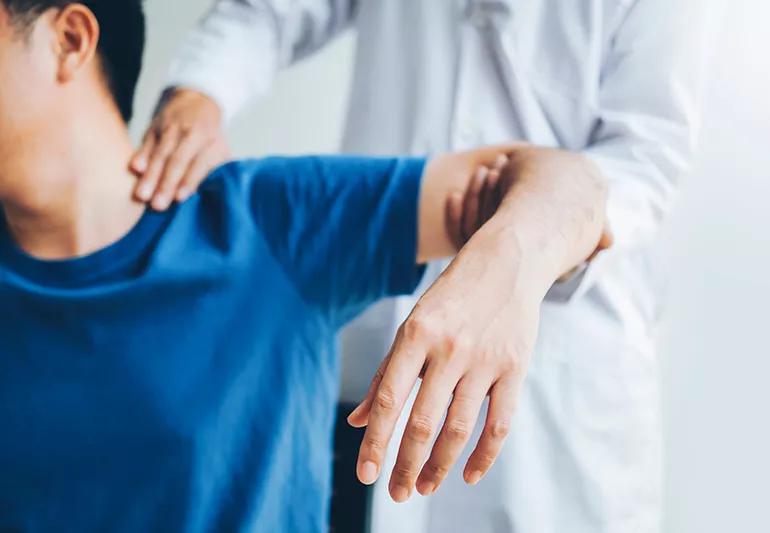What happens when tendons at your shoulder + elbow become inflamed or torn

Do pain and weakness strike when you’re bending your elbow or turning your palm upward? That could signal an injury to the tendons that attach your biceps to bone.
Advertisement
Cleveland Clinic is a non-profit academic medical center. Advertising on our site helps support our mission. We do not endorse non-Cleveland Clinic products or services. Policy
“The function of the biceps muscle is to flex the elbow and to turn the palm up such as what you would do to open a door,” says orthopaedic surgeon Mark Schickendantz, MD.
The biceps muscle is attached by two tendons — or strong fibrous tissues — at the shoulder (proximal tendons) and by one tendon at the elbow (distal tendon). “The biceps tendons can develop tendonitis, partial tearing and can completely rupture,” says Dr. Schickendantz.
Injuries to those tendons at your shoulder or elbow have different symptoms and treatments. Here’s a break down of what each feels like and what help is available:
There are two biceps tendons at your shoulder. These are called the long head and short head. “The long head of the tendon is deep in the shoulder, and it passes out of the shoulder joint into a little groove at the top of the humerus bone,” explains Dr. Schickendantz. This lengthy pathway makes the long head of the biceps tendon more prone to injury than the short head.
The long head of the biceps tendon can become inflamed or irritated, a painful condition called tendonitis. “Proximal biceps tendonitis causes pain along the biceps muscle in the upper part of your arm with activities that involve bending the elbow or lifting your arm overhead,” he says.
Advertisement
Tendonitis may lead to partial tears in your proximal biceps tendon —and that causes pain when you use the muscle. Partial tears can progress to a complete rupture of the tendon, causing it to detach from the bone.
“If the tendon ruptures completely, you’d notice a bump in your upper arm at the biceps muscle called a Popeye deformity,” says Dr. Schickendantz.
Severe proximal biceps tendon injuries can cause muscle weakness and difficulties doing certain tasks that involve rotating the palm (think: opening a jar.)
How a proximal biceps injury is treated depends upon how severe the injury is as well as your physical needs, Dr. Schickendantz says.
Tendonitis is usually treated by modifying your activities and anti-inflammatory drugs, such as ibuprofen (Advil®, Motrin®).
Chronic biceps tendon disease that isn’t responding to these treatments may be treated by arthroscopic surgery. Options include scraping away diseased tissue (debridement), cutting the tendon (tenotomy) or cutting and reattaching the tendon to a different site (tenodesis).
Surgery is offered to people with very severe tendonitis or high-grade tearing. Surgery may also be done for people who have a physically demanding job or lifestyle. “An older adult who plays sports just once in a while may never need to have surgery,” says Dr. Schickendantz.
The distal biceps tendon runs from your lower biceps muscle, across the elbow crease, and attaches to your radius (one of the two bones in your forearm). The most common injury of the distal biceps tendon is rupture.
“This is caused by overload of the tendon when you have your arm extended with the elbow straight and you forcefully lift something heavy,” explains Dr. Schickendantz. This injury causes significant loss of elbow function. “Distal biceps tendon ruptures tend to be surgically repaired regardless of the person’s age,” he says.
Older adults are more prone to bicep tendon injuries simply because of the natural aging process, Dr. Schickendantz says.
Biceps tendon injuries are usually caused by damage from normal wear and tear on the joints. And then add to that if there’s overuse of the joint, like from certain sports or occupations. Also, you can get a biceps tendon injury from pulling or lifting a heavy object with your arm straight, or falling on an outstretched arm.
Taking medications that suppress your immune system for a long period of time puts you at a slightly higher risk of a biceps tendon injury. A group of antibiotics called fluoroquinolones (ciprofloxacin is an example) have been associated with increased risk of biceps tendon rupture.
Advertisement
“There is no cause and effect of having arthritis in the shoulder unless someone has severe inflammatory arthritis, which increases risk for tendon ruptures everywhere,” explains Dr. Schickendantz.
This article was adapted from Cleveland Clinic Arthritis Advisor.
Advertisement
Learn more about our editorial process.
Advertisement

Surgeon addresses common brachioplasty questions

Overusing your biceps can cause inflammation

Plus, ways to keep your bones healthy and strong!

Bone health starts with proper nutrition, exercise and healthy lifestyle choices

Cramps can creep up if your shoes are too tight, you’re dehydrated or you have poor circulation

Vitamin D is an umbrella term for both D2 and D3 — both help keep your bones and immune system strong

These creams that you apply to your skin can actually help reduce localized pain, swelling and inflammation

This satisfying, involuntary act of yawning and stretching helps release tight muscles

If you’re feeling short of breath, sleep can be tough — propping yourself up or sleeping on your side may help

If you fear the unknown or find yourself needing reassurance often, you may identify with this attachment style

If you’re looking to boost your gut health, it’s better to get fiber from whole foods